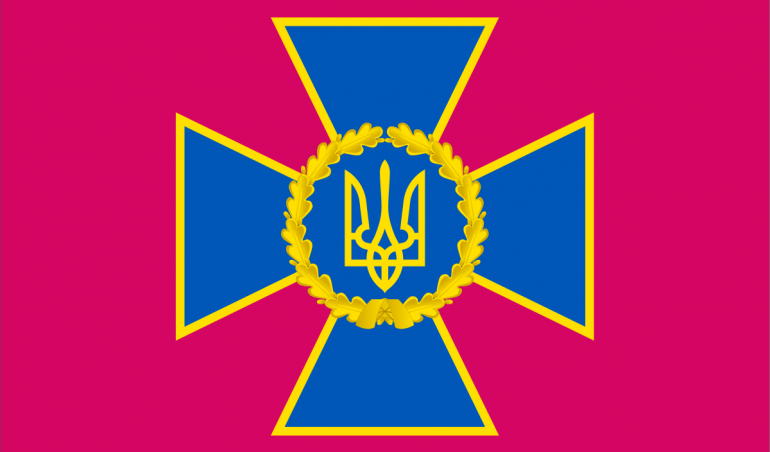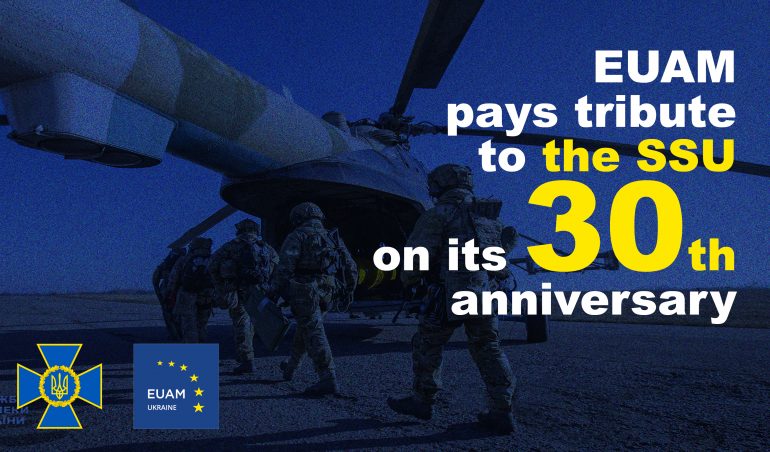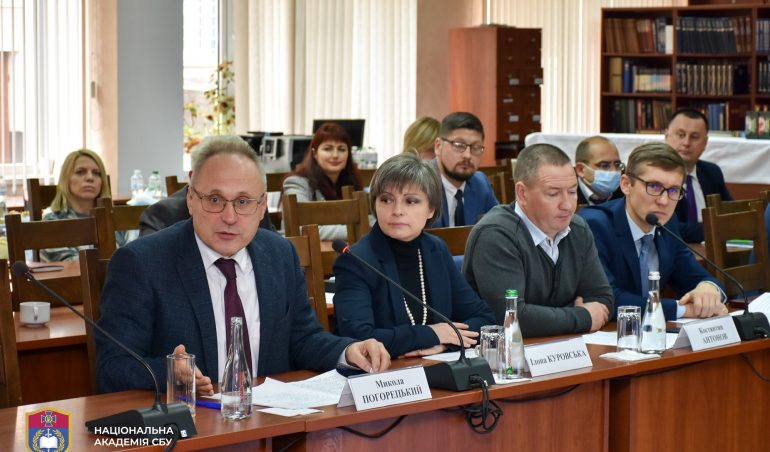Security Service of Ukraine: EUAM answers 13 questions on the ongoing reform
June 25, 2021
In 2016, the European Union Advisory Mission (EUAM) joined the EU Delegation, the North Atlantic Treaty Organisation (NATO) Liaison Office and the US Embassy to establish the International Advisory Group (IAG)* and to jointly support the reform of Ukraine’s security sector in general and the Security Service of Ukraine (SSU) in particular.
A few weeks ago, the IAG publicly welcomed a new draft law on the SSU. Today, EUAM answers 13 open questions to explain why this reform process is important for the SSU and for Ukraine.
1. How does the IAG support reform of the SSU?
The IAG believes that the SSU needs to undergo substantial reform to become a modern, European security service that is more capable of protecting Ukraine from internal and external threats, notably from Russia.
The IAG holds that the service should, in line with European and Euro-Atlantic standards and best practices, be depoliticised, down-sized, demilitarised and transformed into a civilian service with no law enforcement functions, under effective democratic and civilian oversight, and enshrining respect for human and civil rights in its day-to-day work.
Law enforcement functions over economic crime, organised crime, corruption, and smuggling should be transferred to other agencies, including the future Bureau of Economic Security. This reform would transform the SSU from a law enforcement body to a security service, in line with European principles and best practices.
2. How do you assess the draft law adopted in a first reading in January?
The new SSU draft law was presented by President Zelensky in March 2020. Since then, a parliamentary working group, in which the IAG has participated, has been working to improve it. The working group also included a broad spectrum of members from the Verkhovna Rada of Ukraine (VRU), SSU, expert community, and civil society.
The draft law that passed the first reading in January 2021 reflects much of our advice. President Zelensky’s personal involvement and support for the draft law was essential for its approval in the first reading.
The IAG welcomed the approval of the draft Law and expressed the hope that it would undergo further improvement ahead of the second reading while its key reform achievements would be safeguarded. Since January, work has continued in the working group to refine and improve the draft law.
3. What is the opinion of the IAG about the latest version of the draft law?
The IAG was asked to review the draft law shared by VRU Working Group Chairwoman Bezuhla on 3 June ahead of its consideration and endorsement by the VRU Committee on National Security, Defence and Intelligence, and the second and final plenary reading.
The IAG welcomed that draft as a solid basis for meaningful and substantial reform of the SSU in line with European and Euro-Atlantic principles and best practice. Importantly, the draft law foresees the complete phasing out of pre-trial investigative powers and detention centres, significant downsizing and demilitarisation of the Service, and the strengthening of oversight mechanisms.
The IAG strongly encouraged the VRU to protect the integrity of these provisions while, at the same time, addressing outstanding issues and concerns before the adoption of the law in the second reading. If adopted and fully implemented, this draft law would make the SSU more efficient, effective, and accountable, as well as more capable of countering threats to Ukraine’s security.
The IAG called on the Rada to adopt the draft law without delay.
#IAG Statement on @ServiceSsu draft law@EUDelegationUA @NATOinUkraine @USEmbassyKyiv pic.twitter.com/NtjBzZOvf3
— EUAM_Ukraine (@EUAM_Ukraine) June 7, 2021
4. Why is it so important to completely phase out the SSU’s pre-trial investigative powers?
EU and NATO member states regulate the separation of counterintelligence and criminal investigation in general through a strict legal separation based on the decoupling imperative. This legal principle holds that intelligence and police must not merge and conduct the same tasks.
The landmark PACE Recommendation 1402 of 1999, states that internal security services should not be authorised to carry out law-enforcement tasks such as criminal investigations, arrests, or detention. Due to the high risk of abuse of these powers and to avoid duplication of traditional police activities, such powers should be exclusive to other law-enforcement agencies.
The UN Compilation of Good Practices also advises against combining intelligence and law enforcement powers in one agency, taking into consideration the risk of developing a parallel enforcement system. The institutional separation between security services and law-enforcement agencies is a strong safeguard against too much concentration of power in one service, and the risk of arbitrary use of intelligence collected through covert methods.
When security services identify a threat to national security, they should share the information they collected with state bodies who have the authority to act on this intelligence and enforce the law, i.e. police and other law-enforcement agencies.
In line with these international standards, most democratic states limit the mandate of their security services to collection, processing and dissemination of information; and do not entrust them with law enforcement powers.
5. Are other law-enforcement agencies ready to assume such specialised investigations?
Law-enforcement agencies who would take over investigative authority in specific areas from the SSU, as set out in the Criminal Code of Ukraine, will, in many instances, need to build up their capacity. The decision to transfer SSU pre-trial investigative authority to other law-enforcement agencies will therefore require a comprehensive approach, methodological planning, and adequate resource allocation ideally set out in a roadmap in the SSU law.
We, therefore, welcome the approach of the draft law to phase out SSU pre-trial investigative authority by 2023. We deem this time period sufficient to build up necessary capacity in agencies that would take over the specific powers, also since investigative competencies over some crimes can be transferred relatively easy and swiftly, while others will require more time and effort.
6. Wouldn’t it make sense to keep those investigations with the SSU that relate to state security as is the case in some EU member states?
A large majority of EU member states have domestic security services without any pre-trial investigative powers. Seven out of 27 EU member states provide their domestic security services with limited pre-trial investigative authority in the areas of counterintelligence, counterterrorism, and the protection of classified information.
At the same time, the differences to the Ukrainian approach are profound:
• None of these seven services are attached to a head of state or government but they are under the responsibility of ministers of interior or justice, or a council of ministers in one case.
• In these services, the personnel is a mixture of police and civil servants, not mostly military as currently the case in Ukraine.
• The number of personnel in the EU services is limited and proportional to the respective populations.
• There is a clear separation between intelligence officers and criminal investigators within the services.
• Their pre-trial investigation powers are limited to those granted by the respective criminal procedure codes.
• While these seven EU services can detain persons (with one exception), they do not run their own detention facilities (with one exception) and can hold persons for 48-72 hours (again with one exception).
• Last but not least, effective external control and oversight mechanisms are in place.
• To sum up, the hand full of exceptions in the EU to the international gold standard of separating law enforcement from intelligence come with solid safeguards against abuse. In the case of the SSU, given its vast powers and competencies, the IAG recommendation is to clearly separate law enforcement and intelligence powers. This would improve the SSU’s efficiency and effectiveness. To leave some investigative powers with the SSU, together with the provision that any case could be transferred from the Prosecutor-General to the SSU on grounds of state security, would not constitute meaningful reform of the SSU.
7. Some argue that in a country like Ukraine it doesn’t matter which institution has pre-trial investigative powers because they will be abused in any case?
We do not agree with the premise of this argument since it assumes that corruption, abuse, and human rights violations in the service are innate and cannot be eradicated. Ukraine has made tremendous progress in reform over the past few years. This shows that it is possible to have institutions with such powers that are not abused.
Integrity encroachments of a country’s domestic security service can never be accepted by its citizens and politicians, even less by its service members, since domestic and intelligence services are the advance warning system of state security, the tripwire, so to say, for all those from inside and outside the country who act to undermine a state’s integrity and sovereignty.
On the contrary, and as reflected in international recommendations, it is exactly the high risk of abuse of law enforcement powers combined with intelligence powers, that has led most EU and Euro-Atlantic countries to clearly separate them, or at least install effective safeguards and firewalls. Since the latter is not yet well developed in Ukraine, the only real choice is to use the historic opportunity and transfer the SSU law enforcement powers to other agencies.
A more integrated, trusted and effective SSU will also find it way easier to enhance its cooperation with European and Euro-Atlantic counterparts since it is mainly the current state of affairs that prevents closer alignment in security and intelligence cooperation.
8. Can Ukraine afford an SSU that no longer deals with economic crimes, smuggling and anti-corruption, given that these are elements of Russia’s hybrid war against Ukraine?
The IAG advises that the SSU remains involved in combatting these phenomena, but only as an intelligence agency, not a law-enforcement body. When security services identify a threat to national or state security, they should share the information they collected with state bodies who have the authority to act on this intelligence and enforce the law, i.e. police and other law-enforcement agencies.
9. Does it make sense to downsize the SSU in times of an unprecedented hybrid war against Ukraine and in light of the size of its Russian counterpart?
The SSU today is oversized in relation to Ukraine’s population. The personnel strength has actually become a weakness and not a strength. Around 95% of the service’s budget is spent on personnel, with almost no room for investments in modern technology and know-how. Big does not mean better – but rather less efficient and effective.
The IAG has looked at US and UK personnel numbers of domestic and foreign intelligence services in relation to the population size. If the SSU strength was to conform to the UK/US average, then its personnel would be around 5.500 instead of the current effective 24.000 and authorized 31.000.
Another recent analysis of EU security services with pre-trial investigative powers showed that the highest number of agents per 100.000 inhabitants was Denmark with 17. In comparison, Ukraine’s ratio would be 40 SSU staff per 100.000 in case of the reform goal of 17.000 personnel, 54 against the current effective strength, and 70 against the authorized strength of 31.000 staff.
In the light of these comparisons, the planned phased downsizing of SSU personnel to 17,000 over several years as per draft law is a reasonable and affordable step. As to Russian figures, if one calculates out border guards from the FSB, then the ratio per 100.000 population is somewhere near 46, according to open-source figures.
10. Doesn’t the SSU need to be large in order to match the size of the Russian intelligence services?
Countering Russian hybrid efforts in Ukraine requires quality rather than quantity of SSU staff. Focusing on developing human resources, technology, know-how, and international cooperation is key to an effective security service. Being big can be a disadvantage as it means greater bureaucracy, inefficiencies, and ineffectiveness. The reform and modernisation of the SSU would make it more capable of countering threats to Ukraine, including from the Russian services.
11. What about demilitarisation? Why is this an issue?
The reduction of military personnel and introduction of civilian management culture and organisation will facilitate enhanced interaction between the SSU and its civilian Western counterparts, which are almost fully staffed by civilians. It would also bring with it the benefits of modern and flexible management helping the SSU to become more agile and responsive to modern challenges.
Most of the current SSU staff hold a military rank, although their functions are not military nor require specialised military skills. Military rank entails competitive salaries along with additional benefits, such as housing, and medical care.
The IAG has advised introducing special SSU ranks, as part of the effort to transform the service into civilian service. This would create important preconditions to gradually decrease the percentage of personnel holding military rank. The salaries for special ranks should therefore be competitive to offset the benefits personnel would no longer be eligible for without a military rank. The IAG welcomes that civil servants will remain within the SSU as one out of four personnel categories, according to the draft law, since this is also an essential part of transforming the SSU into a civilian security service.
We also reiterate that the draft law should outline a clear roadmap and timeframe for the reduction of military personnel to the minimum required. This would not affect military counterintelligence and intervention units such as Alfa where specialized military skills will continue to be required.
12. Should the SSU really demilitarise, downsize, and drop its pre-trial investigative powers when it is at war with Russia?
An argument often used is that the SSU should not reform because Ukraine is at war with Russia. The IAG – EU, NATO, and the US – is adamant that reform should not weaken Ukraine’s capacity to defend itself. On the contrary, the IAG believes that reform will make the SSU more efficient, effective, and capable to defending Ukraine from Russian aggression and hybrid warfare. Modernising the service will result in a more agile, flexible, and capable organisation.
13. Should counterintelligence materials be allowed as evidence in criminal proceedings?
The use of counterintelligence materials in court brings up a number of serious challenges. It starts with the way such information is collected, and how the collection and use of such material is regulated. Generally speaking, the threshold and legal requirements for collecting criminal evidence for use in court are higher, due to its different purpose: evidence is collected against an individual while intelligence is collected for the state.
The next aspect is that counterintelligence materials for use in courts are often classified. This has an impact on the right to a fair trial since defendants and their lawyers might not be able to easily access and evaluate them and prepare their defence accordingly. Increasing international exchange of intelligence materials and their use in court proceedings add complexity to this picture, since it becomes more difficult also for judges to assess the quality, lawfulness, and accuracy of such information.
At the end of the day, it is individual judges or panels of judges who decide whether counterintelligence information is admissible in a particular court proceeding, thus with their decision turning intelligence information into evidence. This raises the question of the reliability of the courts but also power relationships between courts and the SSU on the one hand, and trust by the citizens into the judiciary system’s abilities to guarantee the right to a fair trial on the other hand.
And in this regard, there is concern over the risk of uncontrolled use and abuse of counterintelligence materials for political and corrupt ends. The IAG, therefore, recommends that the draft law clearly limits the use of such materials to the most severe criminal offences and defines a clear procedure of how intelligence information is introduced as evidence into a trial. The other recommendation relates to the consistent application of international best practice regarding the necessity and proportionality principles for the use of counterintelligence materials in court.
|
*The International Advisory Group (IAG) This IAG forms part of the overall effort to help Ukraine reform and thereby move closer to the EU and NATO. It played an essential role in advising on the framework Law on National Security (LNS) adopted in 2018. Following the adoption of the LNS, the IAG has been involved in advising on its follow-up legislation, such as the draft laws on the SSU, security of classified information, and the establishment of parliamentary oversight over security and intelligence agencies holding intrusive powers. IAG advisers form an interdisciplinary group that brings together relevant subject matter expertise from law enforcement, intelligence, and legislative work, international and European/Euro-Atlantic standards and best practice, Human Rights, oversight, and combatting organized crime, terror, and corruption. In order to complement this expertise or fill actual gaps, the IAG is working closely with other partners such as the Geneva Centre for Security Sector Governance (DCAF). This entails cooperation on legislative review as well as seminars for members of Ukraine’s security sector agencies and parliamentarians. Each of the IAG partners has also separate work strands on technical support and assistance for the SSU. |





